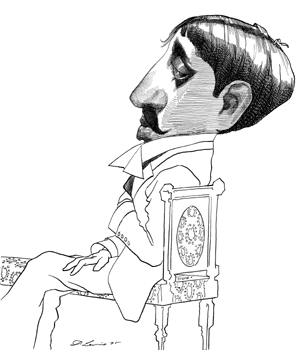Henry James described reading Proust as “inconceivable boredom associated with the most extreme ecstasy which it is possible to imagine.” A bizarre judgment, but it would not perhaps have been wholly uncongenial to the great novelist. Boredom and ecstasy for Proust were not far apart, and certainly in James’s sentence they could easily be switched round, transposed in the manner of a Wilde epigram (and we should not forget Proust’s interest in Wilde). In fact almost any comment made about Proust can be shown to be apposite in one way or another; he is a target impossible to miss; and his obsession with what Roger Shattuck neatly calls the “conflictingly overdetermined quality” of most impressions and events means, among other things, that it is perfectly proper to assert that he writes well, that he writes badly; that he kills his book with a system, that he is a dilettante who is not systematic enough; that he is the gloomiest and most pessimistic writer in the world, that his comic tale is one long peal of happy laughter. Proust is innocent on no count that can be brought against him. Yet as Roger Shattuck points out, the verdict on each and all would have to be “Guilty—but not as charged.”
Shattuck has written what is quite probably the best short book on Proust; certainly one of the most sane, most genial, most illuminating. But of course this too is to say something all but meaningless, for the idea of a concise and businesslike book on Proust, in that admirable series Modern Masters, and hence among such no-nonsense NCOs of literature as Camus and Orwell, is itself acceleratingly funny, with that peculiar propensity of Proustian humor for leaping over the bounds of one joke (humor being usually and rightly self-contained) and so on to the next and the next, until humor itself begins to seem an activity as self-absorbed and laborious as hypochondria.
It is even possible, and perfectly respectable, to think of A la recherche as a novel that tells us much about the nature of mystical experience. So it may, but this does not mean that Proust had such experiences himself. He had no such thing; he cooked them all up, as the true artist does, or rather as Proust insists throughout his labyrinthine essay Contre Sainte-Beuve that he does, for “a book is the product of a very different self from the one we display in our habits, in society, in our vices.” It is for this reason that even Painter’s biography, however fascinating as a collection of fact, story, and gossip, cannot give us much real critical illumination. Proust—Joyce too—is the very opposite of such writers as Chateaubriand, or Norman Mailer, for whom the work is, quite simply, the man. That Proust in his later years used to attend a rather special maison de passe, because he was sexually excited by the sight of rats in a cellar being caught and chopped up, has nothing whatever to do with the craftsman who was composing A la recherche. This is something that today we find increasingly hard to accept—Sainte-Beuve saw the way the wind was blowing—which may mean that the age and the art of Joyce and Proust are almost definitively over.
Proust required what amounts to a mystical theory to get him going. So much is certain. Shattuck mentions R. C. Zaehner’s excellent chapter on Proust in Mysticism, Sacred and Profane, in which it is suggested that Proust underwent “the natural mystical experience,” something equivalent to accounts of the Zen satori. Shattuck writes:
My own view parallels Zaehner’s. I believe Proust was in search of an integration of his sense of self beyond the pure present. In spite of some slippage in vocabulary and in figures of speech, his most elevated passages are not properly speaking religious but physiological and psychological, based on the secular experience of impressions and resurrections…. [These] can be considered “spiritual” in several senses of the word…a major theme in a long novel that can indeed be read as a spiritual exercise. But the novel’s fall-redemption theme grows out of the basic movement of forgetting-remembering. It should not be given religious or transcendent meaning beyond that of developing a heightened mental capacity to respond to such experiences.
Exactly. The secret of Proust’s success is to have seen how to make use of what we all experience, to explore with all the majesty of art the joyful mental possibilities that attend the most ignoble and commonplace and everyday consciousness. Richard Ellmann emphasizes that Joyce perceives and gives expression to the artist in Everyman, and the same is true of Proust. Being French, Proust had to dress things up a lot more, make greater claims, cultivate his own inimitable form of Gallic portentousness, but Bloom and Marcel—in spite of all those “elevated passages”—are brothers under the skin.
Advertisement
For one thing, neither had any use for the “beautiful”—Joyce openly (in his early essay “Drama and Life,” he comments, “A yet more insidious claim is the claim for beauty”), Proust secretly. Gide (who to the firm’s lasting chagrin turned down A la recherche when it was offered to Gallimard) perceived this when he remarked that beauty did not really interest Proust—“it had too little to do with desire.” A spiteful comment, which backfires on Gide, because one of the most subtly and pervasively effective things that Proust creates in his novel is just how much our sexual reveries and desires intertwine with and are a part of our whole apprehension of the physical world. The stately pavane of the Martinville steeples seen from a moving vantage point is an integral part of Marcel’s fantasies about the social and sexual life of the haut monde which he is obsessed with.
The most interesting, and the most original, part of Shattuck’s argument in fact confirms just how immensely and wholesomely commonplace is the origin of Proust’s literary esotericism. If Shattuck is right, and I feel sure that he is, the master figure in the Proustian carpet comes from no more arcane a source than the author’s probably unconscious recollection of one of Montaigne’s most celebrated essays, “On Presumption.” A passage occurs there which the sixty-year-old essayist inserted in the text he had first composed twenty years previously.
I feel oppressed by an error of mind which offends me both as unjust and even more as annoying. I try to correct it, but I cannot root it out. It is that I attach too little value to things I possess, just because I possess them; and overvalue anything strange, absent, and not mine. This frame of mind extends very far.
What could be more obvious than that? But it does indeed “extend very far.” The peculiar fascination and intensity with which Montaigne contemplates this phenomenon in himself could hardly fail to have struck Proust; and, as Shattuck implies, it is really the simple basis for his whole elaborate theory of consciousness. It is a proposition about the nature of elsewhere, and Shattuck defines the premise thus: “Whatever bends to our desire disqualifies itself by becoming a part of ourselves.”
When he is dining with Saint-Loup at the Rivebelle restaurant, Marcel notices that the elegant customers act just as compulsively as he himself does. “At each table the diners had eyes only for the tables at which they were not seated.” When Madame de Stermaria accepts his invitation to an intimate dinner, he finds he would rather have the evening free to see some other woman. It is of course the basis not only of snobbery—which Proust saw as an essentially romantic phenomenon, reminding those who thought it sordid that a whole springtime of social flowers is constantly blossoming in the snob’s imagination—but also of love. Albertine exists to be the personification and exemplar of it; and as the narrator observes during Marcel’s suffering at her absence: “Man is the being who cannot get out of himself, who knows others only in himself, and, if he denies it, lies.”
French authors usually find it their duty to turn a commonplace into a principle—the two concepts are really rather different—and Proust certainly overdoes his “Elsewhere” principle. Most people are equally capable of enjoying what is familiar to them, just because it is familiar. But in a sense Proust anticipates this objection: for the converse of that erreur d’âme of Montaigne is the power that consciousness possesses of suddenly seeing the point of what it had ignored, of rediscovering the elsewhere in the familiar. This is indeed the foundation of art.
Shattuck appositely quotes Raymond Radiguet’s definition of literature’s function to “déniaiser les lieux communs.” Like Emma Bovary at Rodolphe’s ball, we revere art because through its medium even the sugar in the bowl becomes whiter and finer than the sugar at home. Nor does it spoil the miracle—the authentic miracle—when we realize and understand the homely ways in which it is worked. One of the charms of A la recherche is the way allows us to see through it, take it apart, scoff at it. When we next look it is all back in place again, equally true, equally funny; while the author seems to be coyly refraining from addressing us in the words of his beloved Baudelaire as his hypocrite lecteur, his semblable—perhaps even his frère.
This Issue
March 6, 1975



